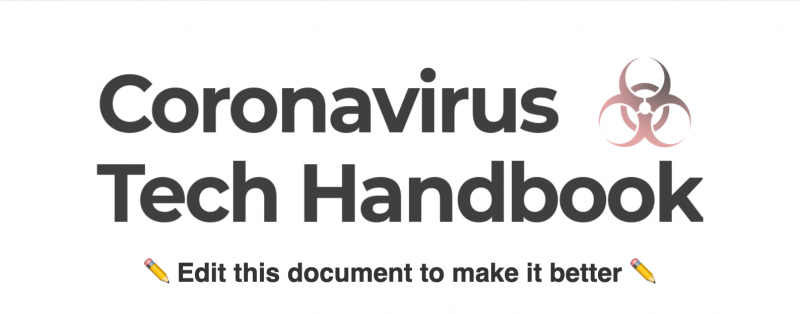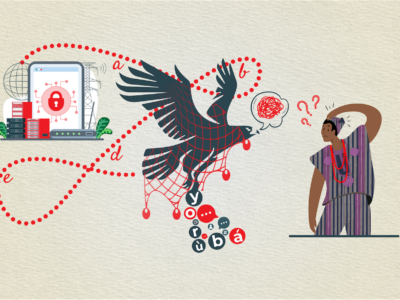
Screenshot of the handbook title, used under an Attribution-ShareAlike 4.0 International license.
Rising Voices note: Our biweekly newsletter provides a summary of our recent blog posts about all aspects of digital inclusion including access and adoption of digital tools, as well as different ways and opportunities for communities to fully participate online. Read here for previous editions of this newsletter.
How are you doing these days, dear readers? Hope this issue of our newsletter finds you well.
Aspiring to curate COVID-19-related online resources for public use, Newspeak House has launched the Coronavirus Tech Handbook initiative — a crowd-sourced library where specialists from a variety of fields are contributing their wisdom to aid us all through this stressful time.
In this handbook, you can find useful information for doctors and for educators, from isolation tips to parenting advice. And if you feel like contributing to this collaborative effort, you can also chip in by helping organize it, translate it, or donating to this cause.
There is also a Facebook group to further discuss what resources could be included, as well as WhatsApp channels for “deep dive discussions” for each section.
MORE FROM THE RISING VOICES BLOG
Did you enjoy the rotating Twitter campaigns during 2019, as part of RV’s commemoration of the International Year of Indigenous Languages (#IYIL19)? The good news is that we are extending our campaigning efforts into 2020 by continuing to showcase even more wonderful work from indigenous language activists worldwide. If you are curious about indigenous languages across the world and what’s involved in their promotion and/or revitalization, please stay tuned! You can also read the profile posts as follows to learn more about our recent hosts as well as their work and visions concerning their language.
@ActLenguas (Latin America)
- Aída Naxhielly [es] on challenges of being indigenous in an urban setting and how these challenges have shaped the idea of “community” and the transmission of her language — a Mixtec variant originated from northwestern Oaxaca in Mexico
FUNDING
Are you an organization dedicated to advancing digital rights in Latin America? The Indela (Initiative for digital rights in Latin America) Fund is looking to support your Latin America-based organization in this endeavor. Please see here for details. Application due: April 30, 2020
In response to this current pandemic, Mozilla is expanding the scope of its Mozilla Open Source Support (MOSS) program to encourage open source technology projects that can be part of the solutions. Working on a project at its reasonably mature stage? Please consider applying for this COVID-19 Solutions Fund to give your project a boost. Please see here for additional details.
CALLS FOR PARTICIPATION
Are there a lack of COVID-19 resources in your language? Perhaps you can contribute to translating the World Health Organization recommendations about COVID-19 (March 18 version) for your community, in your own language. Please consider joining the O Foundation in this volunteer-led effort and do your part.
AWARDS
The 2020 Kurt Schork Awards in International Journalism is now calling for submissions in three categories for local reporters in developing countries or countries in transition, freelance journalists in conflict zones, and news fixers assisting foreign reporters. Please see here to learn more about the awards as well as how the application/nomination works. Submission due: May 31, 2020 at midnight (GMT)
TOOLS & RESOURCES
For those interested in learning Mapuzugun (the Mapuche language), our friends at @kimeltuwe have put together a free learning course. Come join other learners on Memrise!
For journalism educators and students affected by COVID-19: Poynter is offering its News University webinars and self-directed courses free of charge through May. Please see here as to how you can benefit from this offer, a service to the community in a challenging time.
ADDITIONAL READINGS, LISTENINGS, and VIEWINGS
- Bottom-up Connectivity Strategies: Why is research on community networks necessary? via APC (Association for Progressive Communications)
- Esperantisto en Amsterdamo en la kronviruso-tempo [eo] as presented by Federico Gobbo via YouTube
Support our work
Since Rising Voices launched in 2007, we’ve supported nearly 100 underrepresented communities through training, mentoring, microgrants and connections with peer networks. Our support has helped these groups develop bottom-up approaches to using technology and the internet to meet their needs and enhance their lives.
Please consider making a donation to help us continue this work.



